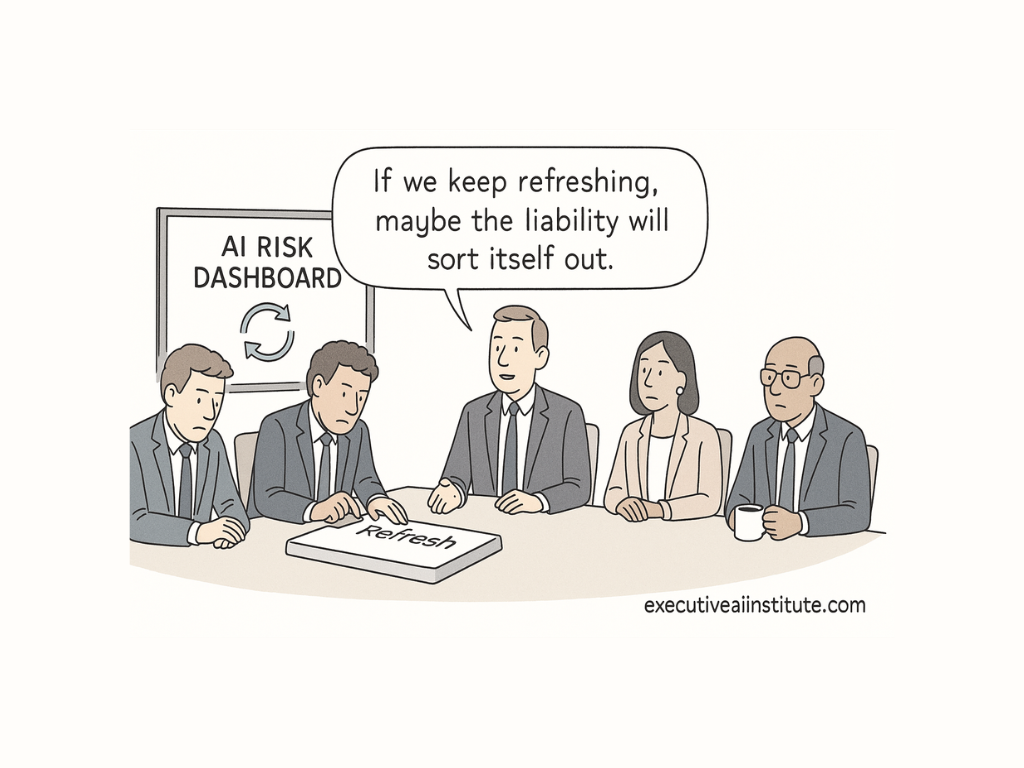This week I had the privilege of facilitating an Executive AI Institute session for more than 300 directors in the Corporate Governance Institute’s global network. AI, is no longer a technical side-project—it’s the agenda item that keeps leaders refresh-refresh-refreshing their risk dashboards.
By the end of our session, five deceptively simple key concerns were echoing in the chat. They’re worth every board’s attention because they decide whether an AI initiative becomes tomorrow’s competitive edge or tomorrow’s headline.
1. WHEN AI DECIDES, WHO CARRIES THE LIABILITY?
Artificial intelligence is the first corporate tool that can both decide and act. Regulators and stakeholders still expect a human name on the dotted line, so directors must understand how models are trained, how they drift and—crucially—where the human override lives. Otherwise, fiduciary duty turns into a blank cheque.

2. ARE WE SUPPORTING THE HUMAN TRANSITION—OR JUST ANNOUNCING A SYSTEM CHANGE?
A go-live date looks neat in a Gantt chart; employee emotions do not. Change is the event, transition is the psychological journey from “how we’ve always done it” to “how we’ll work tomorrow.” Budgets that include training, narrative and room for a collective wobble convert resistance into engagement.

3. IF EXPERTISE IS FREE, WHERE IS OUR EDGE?
When anyone can prompt an LLM for facts, the advantage shifts to capacities machines still fumble with: critical thinking to test assumptions, creativity to frame new questions, communication to turn data into story, collaboration to blend perspectives and curiosity to keep learning after the pilot. Reward human-centric skills and AI becomes a force-multiplier rather than a threat.

4. ARE WE DESIGNING FOR THE EDGES—OR RUBBER-STAMPING THE CENTRE?
Stress-testing systems on outliers—the youngest customer, the smallest supplier, the least-represented voice—does more than avert bias scandals. It widens markets and builds reputational capital. Inclusive design isn’t CSR wallpaper; it’s risk management.

5. WILL RESPONSIBLE-AI OVERSIGHT BECOME AS ROUTINE AS AUDIT?
Digital failures often trace back to hazy vision, token training and communication that evaporates once the pilot “works.” The cure is mundane but potent: awareness, policy and ongoing review baked into governance cycles as predictably as remuneration or audit reports. Trust, once lost, is costlier than any innovation budget.

MONDAY-MORNING MOVES
- Put AI literacy on the director-development calendar—before regulators do it for you.
- Allocate real money to transition support, not just software licences.
- Celebrate the five Cs (Critical Thinking, Creativity, Communication, Collaboration, Curiosity) as visibly as quarterly numbers.
- Stress-test every model on the margins before launch.
- Make ethics reviews a standing agenda item—routine, unavoidable, expectation-setting.
Algorithms will keep improving. Cultures, accountability structures and human skills will not. Exactly where your organisation lands on that divide is, quite literally, a board decision waiting for its time slot.
PARTICIPANT FEEDBACK
Below is the unsolicited feedback that was provided during the course of the chat session, capturing the thoughts and comments shared spontaneously throughout the interaction.
"I like how this conversation is focused on how people react to changes brought on by AI. As leaders, those are the realities we deal with. The impact of AI is not about tech only – the human side is the most important lever. That’s why ethics is key." — C.A.
"As the mother of 3 ND children – thank you for your outlook re: inclusion and the benefit of diverse thinking, J.!" — C.H.M.
"Thank you so much, a great presentation!" — E.B.
"Excellent session. Thank you." — W.H.Y.
"Excellent session – thank you for organising and delivering!" — P.F.D.A.
"Thanks for the support for very tried and tested change management approaches, J.; AI is just one more (massive!) change and humans need help with it..." — J.T.
"Excellent teaching and insights – so helpful! Thank you." — F.W.
"Really great session, thank you so much!" — S.S.
"Really good presentation – hopefully able to share?" — J.L.
"Amazing talk! Our journey toward better decision-making involves drawing on insights from diverse disciplines, maintaining active open-mindedness and continuously searching for the best possibilities." — P.F.D.A.
"Excellent discussion. Lots to think about. Thank you." — M.P.
"Great presentation, Jamie., and thank you." — C.A.M.
"Thanks a lot – good session." — M.M.K.
"Thank you so much — excellent presentation." — A.D.
"Great session – a lot to learn and reflect on. Thank you." — C.A.
"Excellent presentation – addressed a lot of my concerns." — I.G.
"Thank you, J. Great presentation!" — S.G.K.F.
"Great insightful discussion, thank you." — I.S.
"Thank you so much. Great session." — E.K.
"Thank you – very interesting!" — L.T.
"Very good session – thanks a lot." — B.V.
"Interested in follow-ups." — K.W.
"Super presentation – thank you so much." — C.H.M.
"Thank you, J. Very thought-provoking." — V.C.
"Change has to be managed – human and ethical elements being the most important." — V.C.
"Thank you." — M.P.
"Thank you – great insightful sharing!" — N.A.A.Z.
"Thank you – really interesting session." — K.W.
"Best AI presentation I’ve attended! Thank you!" — S.S.
"Great webinar." — K.W.
"Wonderful." — S.D.
"Really good session – refreshing." — L.B.
"Thanks so much!" — J.T.
"Fab, thank you." — J.G.
"Great event – very insightful!" — P.D.
"Amazing session – thanks J.!" — V.P.
"Thanks both." — J.L.


.png)
.png)
.png)